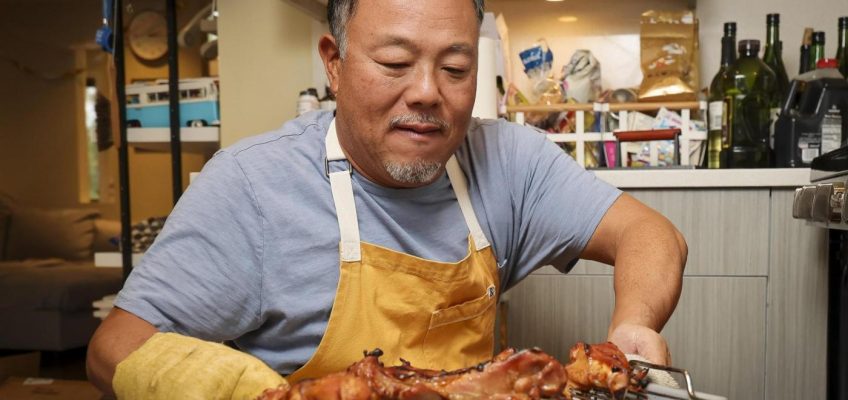By MARK KENNEDY, AP Entertainment Writer
NEW YORK (AP) — Two things that made massive cultural splashes this year — Labubu and “KPop Demon Hunters” — will fill the sky and streets of New York when the Macy’s Thanksgiving Day Parade kicks off this year. Conan Gray and Lainey Wilson will bring the tunes.
The Nov. 27 parade begins rain or shine on Manhattan’s Upper West Side and ends at Macy’s Herald Square flagship store on 34th Street, which serves as a stage and backdrop for performances. It will feature 34 balloons, four mini-balloons, 28 floats, 33 clown groups and 11 marching bands — all leading the way for Santa Claus.
Here’s key things to know about the parade and how to watch it.
What time does the Macy’s Thanksgiving Day Parade start?
It starts at 8:30 a.m. Eastern and airs at that time in all time zones.
New Thanksgiving Day floats are displayed during a press preview of the new floats at Macy’s Parade Studio in Moonachie, N.J., Tuesday, Nov. 18, 2025. (AP Photo/Seth Wenig)
What channel is the Macy’s Thanksgiving Day Parade on?
It will be on NBC, available with an antenna or through cable and satellite providers.
What if I want to stream it?
For cord cutters, the parade is being simulcast on Peacock and an encore telecast begins at 2 p.m. EST/PST. A Spanish language simulcast will also be on Telemundo.
Last year, more than 31 million people tuned in on NBC and Peacock, up 10% from the previous year and marking the biggest audience ever for the parade.
A new Thanksgiving Day float featuring a monster from the show “Stranger Things” is displayed during a press preview of the new floats at Macy’s Parade Studio in Moonachie, N.J., Tuesday, Nov. 18, 2025. (AP Photo/Seth Wenig)
What’s the weather going to be like?
The Weather Channel predicts a high of 48 degrees and a partly cloudy day, with winds up to 13 mph. AccuWeather also predicts 48 degrees with intervals of clouds and winds at 12 mph. New York City law prohibits Macy’s from flying the full-size balloons if sustained winds exceed 23 mph or wind gusts are over 35 mph.
Who are some of the stars performing?
In addition to Gray and Wilson singing, “Wicked” star Cynthia Erivo will kick off the starry moving show. Audrey Nuna, EJAE and Rei Ami of HUNTR/X, the fictional girl group at the heart of the Netflix hit “KPop Demon Hunters,” will feature alongside Ciara, Foreigner, Lil Jon, Kool & the Gang, Busta Rhymes, Mickey Guyton and Teyana. An eclectic group of stars — from ballet dancer Tiler Peck to YouTube’s “Hot Ones” host Sean Evans — will join the annual holiday kick-off.
Sheep adorn a float by Serta during a press preview of the new floats at Macy’s Parade Studio in Moonachie, N.J., Tuesday, Nov. 18, 2025. (AP Photo/Seth Wenig)
Broadway will be represented by cast members from “Buena Vista Social Club,” “Just in Time” and “Ragtime,” while the Radio City Rockettes will be there and some serious athletes — three-time U.S. national champion figure skater Ilia Malinin and U.S Paralympian Jack Wallace. Alumni and students at LaGuardia High School in New York City — the school featured in the movie and TV series “Fame” — will help celebrate the 50th anniversary of “A Chorus Line.”
Others on hand will be Alison Brie, Jewel, Debbie Gibson, Drew Baldridge, Matteo Bocelli, Colbie Caillat, Gavin DeGraw, Meg Donnelly, Christopher Jackson, Darlene Love, Roman Mejia, Taylor Momsen, Calum Scott, Shaggy, Lauren Spencer Smith and Luísa Sonza.
Who is hosting the Macy’s Thanksgiving Day Parade?
For those watching on TV or computers, the trio of hosting stalwarts — Savannah Guthrie and Al Roker from “Today” and their former colleague Hoda Kotb. On Telemundo, the hosts will be Andrea Meza, Aleyda Ortiz and Clovis Nienow.
A new Thanksgiving Day float featuring Pop Mart’s Labubu, right, and Mokoko are displayed during a press preview of the new floats at Macy’s Parade Studio in Moonachie, N.J., Tuesday, Nov. 18, 2025. (AP Photo/Seth Wenig)
Kotb, who stepped down from “Today” in January, says working the parade was something she wanted to continue to do even after leaving the network, “One was the Olympics and the other were these parades because they’re just such fun, this one especially.”
The timing is good this year for the Kotb family. Her youngest daughter, Hope, is obsessed with “KPop Demon Hunters,” maybe even more than with Taylor Swift or Labubu. “This one is next level,” Kotb jokes. “I’ve never seen anything like it honestly. Labubu does not hold a candle to ‘KPop Demon Hunter’ stuff.”
What are the new balloons?
This year, four new featured character balloons will debut, including Buzz Lightyear, Pac-Man, Mario from Super Mario Brothers and a 32-foot-tall balloon onion carriage featuring eight characters from the world of “Shrek.” “KPop Demon Hunters” will also be represented in the sky with the characters Derpy Tiger and Sussie.
Related Articles
Watch these 22 TV specials, movies and cultural events this holiday season
In ‘The American Revolution,’ Ken Burns’ filmmakers go back to the beginning
Review: ‘Stumble,’ NBC’s cheerleader mockumentary, gives you something to root for
Column: Women grapple with profound loneliness in a trio of new TV shows
A happy circumstance: Bob Ross paintings sell for more than $600K to help public TV stations
What about new floats?
Several new floats will debut this year, including the first Pop Mart float, with Labubu, Skullpanda, Peach Riot, Dimoo, Molly, Duckoo and Mokoko. There will also be floats from Holland America Line, Lego, Lindt chocolates, “Stranger Things” featuring members of Foreigner, and a bunch of whimsical sheep trying to get to sleep courtesy of Serta. The fish-shaped snack Goldfish is returning to the parade with a tiny float that measures just 14 Goldfish crackers long.
Is your state represented by any of the bands?
The marching bands will hail from South Carolina, California, Texas, Arizona, New Hampshire, Mississippi, Alabama, Pennsylvania and Santiago, Panama. The New York Police Department’s marching band will also join. There will also be dancers and cheerleaders from Spirit of America Dance and Spirit of America Cheer.




